
Vanderbilt Global History Seminar
The Global Right Turn, March 29, 2019
At this unique, one-day symposium, leading scholars explored the striking rise of right-wing, authoritarian regimes, exploring this phenomenon’s roots and meanings, comparatively and transnationally. Among the questions they considered were:
- How are and were these movements and their conditions of possibility shaped by the global financial crisis and the politics of austerity?
- What are these movement’s relationships to democratic institutions? To what extent do they attempt to co-opt democratic power, to what extent do they attempt to sideline or displace democratic politics?
- What idealogical and organizational role have the politics of gender and sexuality played, including appeals to “traditional” patriarchal family structures and the performance of masculinist authority?
- In what ways has regime legitimacy and hegemonic consensus been built through the racializing and ethnicizing of national communities and state power, and the politics of nativist boundary-making?
- To what extent does the category of “populism” shed useful light on these movements, and to what extent is it a dead end (conflating left and right mobilizations, over-emphasizing rhetorical tone, for example)?
- What role to prior histories of authoritarian movements and regimes plan in advancing, legitimating and contesting these present-day movements? (through fantasies of authoritarian greatness restored, or cautionary tales of wrong turns to be avoided, for example.)
- How do these movements position themselves in the world? How do they handle similarities and/or homologies between themselves and other movements?